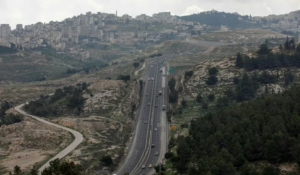Israel approves separate West Bank road for Palestinians, enabling construction in contentious E1 area

Route 1 with the Palestinian town of al-Eizariya in the background in 2020
Hagar Shezaf and Noa Shpigel report in Haaretz on 30 March 2025:
Israel’s Security Cabinet approved on Saturday the construction of a separate road for Palestinians in the West Bank near Jerusalem, which will enable Israel to carry out construction plans in the E1 area beyond the Green Line. The new road could pave the way for the annexation of Ma’aleh Adumim, an Israeli settlement regarded as a suburb of Jerusalem.
Until now, Israel has refrained from building in the E1 area due to sharp international criticism, including from the U.S., as it would create a separation between the two parts of the West Bank, potentially hindering the establishment of a Palestinian state.
The road, to be built south of E1, will connect Palestinian villages in the northern West Bank with those in the south, diverting Palestinian traffic from Route 1. As a result, the road linking Jerusalem and Ma’aleh Adumim will primarily serve Jewish residents.
The government called the resolution “groundbreaking,” adding that it will “improve traffic, strengthen transportation links between Jerusalem, Ma’aleh Adumim, and eastern Binyamin [in the West Bank], and enable continued settlement development in the E1 area.”
The ministers instructed the Civil Administration, the IDF’s branch responsible for administering the West Bank, to prepare for the project’s execution, which is estimated to cost 335 million shekels. The project will be financed by tax revenues from West Bank residents, paid into an off-budget fund.
Defense Minister Israel Katz explained in the proposal’s notes that the road’s construction aims to address heavy traffic in the Ma’aleh Adumim area and reduce security risks posed by the combined movement of Israelis and Palestinians on Route 1. The bill also referenced the terrorist attack in February 2024 near the eastern checkpoint to Jerusalem.
E1 is a 12-square-kilometer area annexed to Ma’aleh Adumim, located to the city’s north and west. Building plans for the area have been in place since the Yitzhak Rabin government in the early 1990s but have been delayed for political reasons since 2005.
This article is reproduced in its entirety
